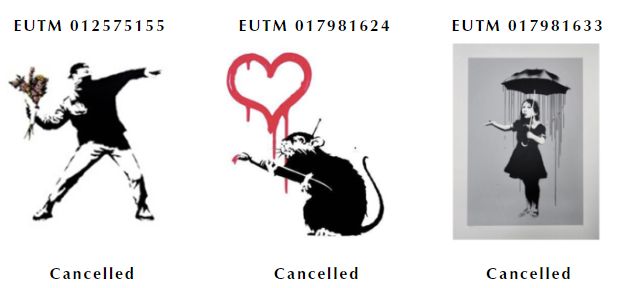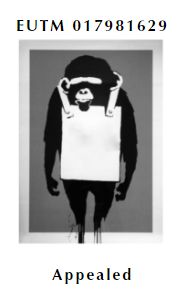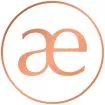Yes...
Initially, it seemed that this was possible, as the (in)famous and anonymous street artist Banksy successfully filed and registered several trademarks depicting some of Banksy's most iconic artworks for a wide range of goods and services.
Through the company Pest Control Office Limited, Banksy filed more than 15 trademark applications with the EUIPO from 2014 to the present day. Initially, Banksy was not met with rejections from the EUIPO, and the applications were allowed to proceed to registration.
No...
The somewhat straightforward answer above then got complicated when the British greeting card company, Full Colour Black Limited, successfully filed applications for cancellation based on invalidity against several of the trademarks registered by Banksy. A few of these cancelled trademark registrations can be seen here:

The cancellation proceedings were key decisions in the somewhat unknown legal sphere of artists' trademark protection of their artwork.
The cancellation applicant, Full Colour Black Limited, generally argued the following points:
- Banksy has never used the sign as a trademark and has no intention to do so.
- Banksy has only reproduced the sign as artwork.
- Banksy has personally claimed "that copyright is for losers", meaning Banksy would try and circumvent copyright law by filing for trademark registration.
- Banksy opened a web shop and pop-up shop, Gross Domestic Product, admittedly, with the sole purpose of claiming actual, commercial use. This should purportedly prevent any actions for invalidity or bad faith as Banksy could then show actual use.
Full Colour Black Limited concluded that Banksy was trying to use trademark protection to monopolize the artworks, and to avoid relying copyright protection, which would require him/her to not be anonymous. Full Colour Black Limited argued that this constituted bad faith and that the registrations should therefore be cancelled.
On the other hand, Banksy argued:
- Full Colour Black Limited failed to demonstrate bad faith.
- The evidence submitted by Full Colour Black Limited cannot demonstrate that Banksy has no intention to use the Trademark.
- What Banksy said (copyright is for losers) is irrelevant to the present case, as it would not prohibit seeking rights and protections available under the law, and the opposite would be contrary to the principles of freedom of expression
The Cancellation Division held that the behaviour of Banksy, especially the opening of the webshop and pop-up shop, showed that that there never was any intention to use the trademark as such. It further held that the sole purpose was to circumvent the enforcement obstacles in copyright, particularly that you cannot act anonymously.
The Cancellation Division, therefore, ruled that the trademarks should be declared invalid due to bad faith under Article 59(1)(b).
Yes again ... Maybe
One of the trademarks that were cancelled due to invalidity was the famous 'Laugh Now But One Day We'll Be In Charge' monkey:

The famous artwork was created in 2002 in Brighton. The artwork was not applied-for as a trademark until 2018. With no opposition filed by a third party, the EUIPO registered the above trademark on 11 June 2019.
However, as part of the cancellation proceedings mentioned above, Full Colour Black limited filed, an application for a declaration of invalidity on the grounds of bad faith and lack of distinctive character. In May 2021 the Cancellation Division once again decided that Banksy's trademark had been filed in bad faith and the trademark registration was subsequently cancelled.
However, this time Banksy appealed the decision.
The Board of Appeal concluded that the burden of proof that the conditions (bad faith, lack of intention to use etc.) lies with the one requesting the cancellation. Therefore, it cannot be assumed without documentation that this is the case at the time of filing, and especially when the trademark is not yet under use-requirement.
The Board of Appeal made several conclusions that would be of interest in similar cases.
The Board of Appeal clearly emphasized that it was possible to protect the same artwork through both copyright and trademark law.
The Board of Appeal also stated that the mere application for trademark registration of art does not equal lack of intention to use the mark.
Another interesting note from the decision is the fact that the Board of Appeal confirmed the five-years grace period to be absolute; it is up to the cancellation applicant to show bad faith on the side of the proprietor. It must be assumed, that there is no bad faith, at least for the grace period.
Finally, the Board of Appeal noted that:
- (80) "...the statement 'Copyright is for losers' has no bearing at all for the case at hand."
Though the deadline for appealing the decision has not yet been reached, the attorney representing Full Colour Black stated:
- "We are naturally disappointed by the ruling ... In terms of next steps, there are no plans to appeal the decision... We will take a reasoned view based upon what Banksy does next."
As such, this may be the beginning of a new era, in which artists may consider trademarks as a supplementary protecting of works.
The content of this article is intended to provide a general guide to the subject matter. Specialist advice should be sought about your specific circumstances.


